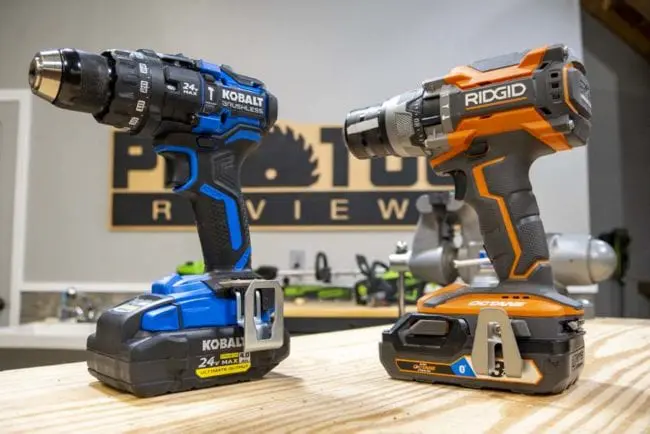With Kobalt introducing its XTR line, it joins Ridgid’s Octane in a unique space: budget-friendly advanced tools. For this Pro Tool Reviews Thursday Throwdown, we decided the main event needed to be the Kobalt XTR vs Ridgid Octane hammer drill.
As advanced tools, both lines take advantage of 21700 lithium-ion cells to power upgraded motors with better electronics packages.
Before we jump into our testing, here’s a quick look at how the two hammer drills look on paper:
| Kobalt XTR | Ridgid Octane | |
| Model Number | KXHD 1424A-03 | R8611506 |
| No-Load Speed (High) | 0 – 2,000 RPM | 0 – 2,000 RPM |
| Maximum Torque | 1,200 in-lbs | 1,300 in-lbs |
| Maximum Blow Rate | 32,000 BPM | 31,000 BPM |
| Retailer | Lowe’s | Home Depot |
These two match up very closely on paper, but it’s the tale of the tests that tell us how each hammer drill translates those numbers into work.
If you’d like to watch the action for yourself, check out our YouTube video!
Kobalt XTR Vs Ridgid Octane Hammer Drill Testing
High-Speed Testing
1-Inch Spade Bit

Using our favorite glued-up 3/4-inch OSB subfloor as a consistent testing material, we kicked both hammer drills into higher speed and chucked up 1-inch Bosch Daredevil Spade Bit.
Both drills moved through the material incredibly fast. For Kobalt, it was an average of 3.84 seconds. Ridgid got through in 3.96 seconds. Considering the difference was just 0.12 seconds, that’s within the realm of human Clint error on the timer and we’re calling it a tie.
Verdict: Tie
1-Inch Auger Bit

To see if we could get some separation, we moved to a smooth-boring 1-Inch Bosch Daredevil High-Speed Auger Bit.
Moving through our subfloor a bit slower, the Kobalt XTR hammer drill needed an average of 4.58 seconds to make the hole. The Ridgid Octane put a little bit of a gap on it at 4.37 seconds.
While still close, 0.21 seconds is likely more than whatever error Clint might have had in the timing.
Verdict: Ridgid Octane
1/4-Inch Concrete Bit

We shifted outside to our 4,000 PSI concrete testing slab and chucked up a 1/4-inch Bosch Daredevil Multipurpose Bit in each drill.
On paper, these two hammer drills have the same top speed, but Kobalt has an extra 1,000 BPM.
It showed in the results as Kobalt’s 5.67-second average had a slight advantage over Ridgid at 5.96 seconds.
Verdict: Kobalt XTR
Low-Speed Testing
1 1/2-Inch Self-Feed Bit

We came back inside and clamped down a pair of 2 x 4 pine studs in our Wilton Tradesman vise to simulate a rough-in using a 1 1/2-inch Milwaukee SwitchBlade self-feed bit.
Kicking each drill into low speed, Kobalt made it through in an impressive 5.06 seconds. Ridgid needed just 5.08 seconds, effectively resulting in another tie.
Verdict: Tie
2 9/16-Inch Self-Feed Bit

We stayed with the same material and switched out for 2 9/16-inch SwitchBlades, hoping for more separation as we asked each drill to call on more power.
Ridgid holds the advantage on paper with 1300 in-lbs to Kobalt’s 1200 in-lbs. Both are impressive numbers, even against premium professional brands.
Despite the difference on paper, Kobalt’s average of 10.83 seconds was enough to beat Ridgid (11.42 seconds) by a little more than half a second.
Verdict: Kobalt XTR
Feature Set
Both hammer drills check off the most common features we expect at the professional-level.
- Brushless motor
- Belt hook
- Two-speed gear box
- All-metal chuck

There are a couple of features that stand out, though.
For Ridgid, it’s the LED light. The three LEDs are positioned around the chuck and virtually eliminate shadows when you’re drilling.
For those of us that are OCD, it has a micro clutch collar that gives you more than 100 clutch settings.
Kobalt pushes for safety by adding anti-kickback controls. When it senses a bit binding up, it automatically stops to reduce the risk of injury to your arm and wrist.
In the end, we believe the kickback controls give Kobalt’s feature set an advantage over Ridgid’s.
Verdict: Kobalt XTR
Size and Weight
Measuring 7.75 inches long and weighing 4.95 pounds with a 4.0Ah Ultimate Output battery (3.35 pounds bare), the Kobalt XTR hammer drill isn’t much bigger than its predecessor despite a huge boost in performance.
The Ridgid Octane hammer drill is quite a bit bigger than the Gen5X brushless model, but that was a compact hammer drill. The Octane is 8.30 inches long and weighs 5.39 pounds with a 3.0Ah Octane battery (3.93 pounds bare).

We chose the batteries we did because they are 1P packs – 1 row of cells. However, Ridgid has an 18V battery with 5 cells and Kobalt runs at 24V max (21.6V) using 6 cells. Even though Ridgid’s battery runs 54 Wh and 86.4 Wh, the differences in design mean weren’t going to get much closer.

The numbers don’t lie and the Kobalt XTR is lighter and smaller than the Ridgid Octane.
Verdict: Kobalt XTR
Price
Price is typically pretty straightforward – we get a bare tool price and a kit price. But this one wasn’t so easy.
Here are some prices for the Kobalt XTR hammer drill at Lowe’s:
- $149 bare
- $199 with 4.0Ah Ultimate Output battery and charger
- $289 as part of a 3-tool combo kit (hammer drill, impact driver, LED light, 4.0Ah and 2.0Ah batteries)
- $399 as part of a 5-tool combo kit (hammer drill, impact driver, circular saw, reciprocating saw, LED light, 4.0Ah and 2.0Ah batteries)
And here’s what we found for the Ridgid Octane hammer drill at Home Depot:
- $329 as part of a 2-tool combo kit (hammer drill, impact driver, 2 x 3.0Ah batteries)
The bare tool was running $169 just a couple of weeks before writing, but it’s currently not available on Home Depot’s website.
Shop Home DepotIt looks like Kobalt is giving you more bang for your buck, at least right now. Both of these are budget-friendly brands, so keep your eyes open for sales!
However, keep in mind that Ridgid offers a lifetime service agreement as long as you register the tool. That trumps Kobalt’s excellent 5-year warranty. But you have to register the tools.
Verdict: Kobalt XTR
The Bottom Line
By our tally, the Kobalt XTR hammer drill wins over the Ridgid Octane hammer drill by a convincing score of 7 to 3, with 2 of those being ties.
But when we look at the most important section, performance, these two advanced hammer drills are so close to each other that it’s difficult to say one is superior to the other.
Of course, that’s why we look more than just performance. Kobalt’s advantage comes with a better feature set, lower weight, smaller footprint, and value. In the end, that’s what made all the difference.
| Kobalt XTR | Ridgid Octane | |
| 1-Inch Spade Bit | 3.84 seconds | 3.96 seconds |
| 1-Inch Auger Bit | 4.58 seconds | 4.37 seconds |
| 1/4-Inch Concrete Bit | 5.67 seconds | 5.96 seconds |
| 1 1/2-Inch Self-Feed Bit | 5.06 seconds | 5.08 seconds |
| 2 9/16-Inch Self-Feed Bit | 10.83 seconds | 11.42 seconds |
| Feature Set Highlight | Kickback Control | Tri-Beam LED/Micro Clutch |
| Size and Weight | 7.75 in/4.95 lbs | 8.30 in/5.39lbs |
| Price (bare) | $149 | $169 |



